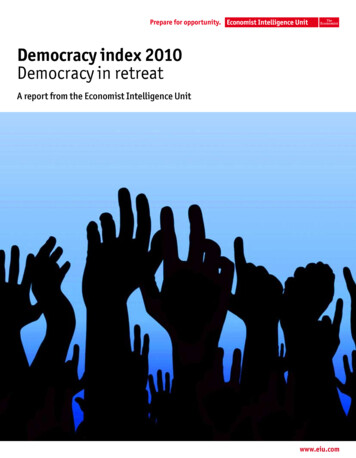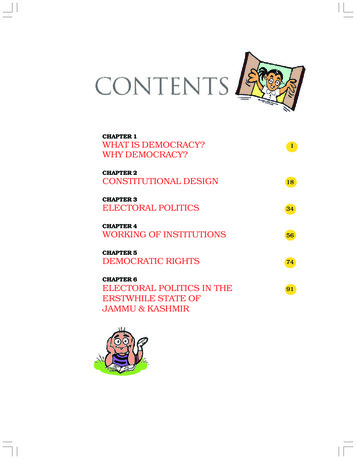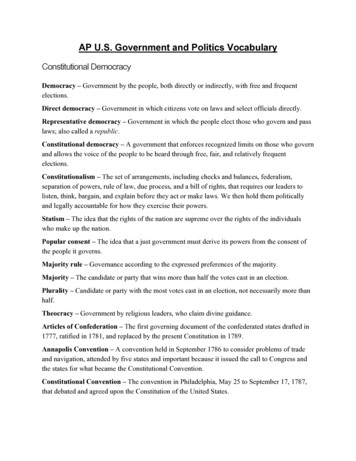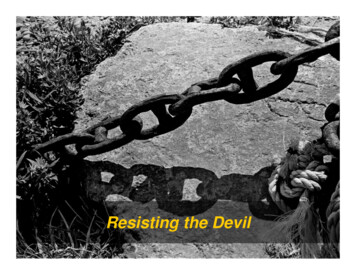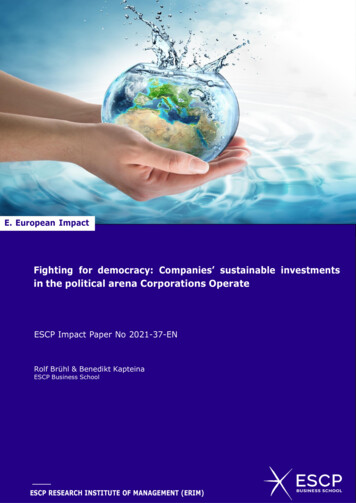
Transcription
E. European ImpactFighting for democracy: Companies’ sustainable investmentsin the political arena Corporations OperateESCP Impact Paper No 2021-37-ENRolf Brühl & Benedikt KapteinaESCP Business SchoolESCP RESEARCH INSTITUTE OF MANAGEMENT (ERIM)
ESCP Impact Paper No.2021-37-ENFighting for democracy: Companies’ sustainable investments in thepolitical arenaRolf BrühlESCP Business SchoolBenedikt Kapteina*ESCP Business SchoolAbstractCompanies depend on a viable political system, which in Western democracies has comeunder pressure due to populist movements. In this paper, we present corporate politicalresponsibility based on strong sustainability. To illustrate this concept, we describe howsome companies operate as political actors and actively position themselves against antidemocratic forces. By investing in political activities, companies can contribute to asustainable strengthening of Western democracies. This new political role of corporations,which goes beyond lobbying and donations, deepens our understanding of corporations aspolitical actors.Keywords: Corporate Social Responsibility, Corporate Political Responsibility; CorporateSociopolitical Activism*Ph.D. studentESCP Impact Papers are in draft form. This paper is circulated for the purposes of comment and discussion only. Hence, itdoes not preclude simultaneous or subsequent publication elsewhere. ESCP Impact Papers are not refereed. The form andcontent of papers are the responsibility of individual authors. ESCP Business School does not bear any responsibility forviews expressed in the articles. Copyright for the paper is held by the individual authors.
Fighting for democracy: Companies’ sustainable investments in thepolitical arenaCompanies and Their Political ResponsibilityTraditionally, companies in Europe do not actively engage in political debates and, inparticular, stay out of political disputes. In recent years, a different trend has emerged: moreand more companies perceive themselves as political actors and engage in politicalactivities that go beyond well-known activities such as lobbying or donations. Newcomerssuch as Spotify as well as established companies such as Volkswagen and ThyssenKrupphave changed their behavior; for example in the context of the previous European elections.They have called on voters to go to the polls to form an opinion on the EU. For instance,through putting up posters on streets and advertising on social media, Swedish musicservice Spotify urged its European users to “Use your voice” with a message and to generateits own EU election playlist (Heath 2019); carmaker Volkswagen, via a giant banner at itsWolfsburg plant, told its employees and the public that “Volkswagen chooses Europe”(Volkswagen AG 2019); and industrial company Thyssenkrupp even launched its owninformation campaign, picking up on various prejudices about the EU such as its penchantfor bureaucracy and debunking them against the backdrop of its own business area(ThyssenKrupp AG 2019). As these examples show, a number of companies are abandoningneutrality and reserve around elections, which is well known from the past. Therefore, thequestion is why they are doing this.Illustration 1. Campaign ThyssenKrupp AG, Europeanelection 2019, Source: ThyssenKrupp AG (2019): European election 2019: The European idea ispart of our DNA. Retrieved from f-our-dna/Changing Political LandscapeThe European political landscape is changing: populists, Eurosceptics and parties from thefar left and far right are celebrating successes in many countries. Populist parties areskillfully presenting themselves as an alternative to an establishment that supposedly doesnot do justice to the will of the people. This populism is often accompanied by a skepticismabout Europe that is intended to appeal to the so-called “globalization losers” – in otherwords, people who apparently do not benefit from the economic and cultural opportunitiesand hope for betterment through a nationalistic policy. In view of several corruption
scandals and the dwindling loyalty of traditional parties to their constituents, antiestablishment slogans of populists sound tempting and raise new voter potential. Whenpopulists call for politics for the people, this does not sound outlandish at first – what elseshould the task of politicians be? But pluralism and protection of minorities as elementarycomponents of liberal democracies are subordinated to the populist fairy tale of a unifiedwill of the people. As if this were not enough, Western democracies are also increasinglyconfronted by a relatively uninformed and weary electorate that is increasingly susceptibleto populist movements. Consequently, companies are not untouched as the politicallandscape in Europe changes, which raises the pressing question of whether companiesshould get involved in politics.Corporate Sociopolitical ActivismGiven the increasing polarization in Western democracies, we see more and morecompanies taking an active stance even on highly charged political issues such asimmigration, gun legislation, LGBTQ rights, or climate and environmental protectionchallenges (Hambrick and Wowak 2021; Kotler and Sarkar 2017; Gaines-Ross 2017). Thepublic support of companies for or against one side through statements and actions is beinglabelled under the relatively new phenomenon of corporate sociopolitical activism(Hambrick and Wowak 2021). In response to a controversial immigration ban in the U.S. ofthe former Trump administration, Starbucks Coffee Company, for instance, made a publiccommitment to increase its hiring of refugees (Starbucks Coffee Company 2021). Corporatesociopolitical activism is often made through public contributions by individual companyrepresentatives such as CEOs (Hambrick and Wowak 2021). The CEOs of Intel, Merck andUnder Armour publicly resigned from U.S. President Donald Trump’s AmericanManufacturing Council after he ignored white nationalist violence in Charlottesville (Erman2017).Although this activism is intended to improve a balance between companies and society, itlargely ignores the political role companies play in democratic systems. We argue thatcompanies only become fully fledged political actors when they actively shape their politicalenvironment away from profit interests and also act beyond their involvement in topicalpolitical debates. Our theoretical framework combines corporate social responsibility withstrong sustainability that aims to contribute to the functioning of society – including thepolitical system – as well as the preservation of nature. It rests on a model that the economyand its companies are embedded in society and that society in turn is embedded in thenatural environment (Brühl 2018).
Figure 1. Alternate conceptions of the business–society–nature interface, The Embedded View,Source: Brühl 2018, modified, Marcus, Kurucz and Colbert 2010, p. 406.Drawing on Young’s perspective, corporate political responsibility is a shared responsibilitybetween business and governmental actors to solve societal challenges (2006). Within thisconceptual view, companies are called upon to invest in the political system in order toimprove conditions for all actors in society. This forms the basis for a corporate politicalresponsibility. Such a conception differs from the commonly favored instrumentalistcorporate social responsibility, which calculates any investment with a business case logic.However, any political engagement can strengthen stakeholder relationships on the onehand and damage them on the other. So far, there is a lack of a theoretically soundunderstanding of how these companies’ political activities affect relationships with differentstakeholders.How Political Can Companies Be?The observed political actions of companies, such as in the context of the European election,go beyond issue-based activism. Companies have actively participated in the formulationand implementation of public policy and have promoted discursive activity withindemocratic society through their engagement. Against the backdrop of rising populism andincreasingly weakened democratic discourse in Europe, companies intervened as politicalagents and acted in a hitherto unprecedented way, in some cases with considerableresources, as influential political actors in the political space that is usually reserved forparties, politicians and the media.Some companies stood out for taking a clear stand against populism. However, the majorityof companies took a roundabout route to encourage people to participate in the election.With this move they intended to raise voter turnout and thus keep populists out ofparliaments. With our framework, we position corporate political responsibility so thatcompanies develop their political stance in the public sphere with concrete approaches toaction. As in the cases described, this is less about party political positioning and more aboutcontributions to stabilize democratic order. This insight is related to the corporate politicalresponsibility approach, which places companies in the economic sphere but embeds themin a democratic political system because they cannot exist in isolation from such a systemin Western societies. Thus, companies do not operate free of politics but are alwaysdependent on the political context they are in embedded in.Political Contributions of CompaniesFor many years, the debate about corporate political activities has been dominated bylobbying, campaign contributions or even corruption. Behind these discussions is an imageof companies characterized by profit maximization and the will to take advantage of anypolitical influence for their own benefit. While our corporate political responsibility approachbased on sustainability is primarily normative, the examples show how some companies aremoving in the direction of our conception.However, companies are powerful organizations whose properties do not correspond tothose of individual actors in a democracy. In particular, the difference in power between thetwo could lead to the assessment that corporate influence is a threat to democraticprocesses. On the one hand, their political activities could be seen as positive in a democraticsystem, while on the other hand others may see such involvement as an abuse of power andan attempt to undermine democratic processes. Our examples should have made it clearthat companies are already political actors. Therefore, the question is not whethercorporations should engage in politics but what the nature and purpose of such
engagements may be. The overarching question is about the legitimacy and associatedsocial acceptability of these political actions and their underlying motives.Past corporate abuse colours public judgment of corporate motives and limits publicacceptance of a legitimate role for corporations as political actors. To change this, and to beable to leverage the democratic potential of increased corporate engagement as a politicalfactor, companies need a political self-image that goes beyond ad hoc activist responses.Our approach goes hand in hand with companies strengthening democratic structureswithout advocating individual parties. In this article, we have focused on them informingcitizens about the meaning and purpose of elections and appealing to them to make use oftheir right to vote. Certainly, objections can be raised against this.Some may see a resurgence of political paternalism in these political activities, because theythink, ‘What business is it of corporations whether I vote?’ After all, elections are free and confidential. After all, participation in political elections is a right, not a duty. And aren’t these companies interfering in areas of life that are none of their businessanyway?In the voting booth, of course, everyone remains alone with his or her political judgment andconscience. But democracy, as we all know, is not just a matter of putting a cross on a ballot.It only works if political opinion and will can be formed freely.When companies encourage people to vote and to think, democracy is not in danger butrather in the process of being lived. Election appeals are one of the many invitations to forman opinion in the first place and to make it known. Democracy thrives on public exchangeof opinions, and this also means that citizens form an opinion and elect representativeswhich accord with that opinion. To be able to best decide which views one feels are right orwrong, it is necessary to exchange opinions with others and to engage in political discourse.Only diversity of opinions makes a political discourse a democratic one. Corporateinvolvement can help counteract political fatigue and revitalize democracy. In addition toleveraging potential for democratic mobilization, it is important not to neglect risks thatcould be mitigated, for example, through greater transparency of corporate activities orimprovements in corporate democracy.ConclusionWe still know little about the influence of the activities within the terms of corporate politicalresponsibility which intends to foster democratic processes and institutions. Nor do weknow whether and to what extent this engagement is linked to specific economic activities.For both empirical and normative reasons, it seems necessary to bring these questions intoscholarly focus. Conceptually, further development of the corporate political responsibilityapproach can help improve our understanding of how corporations operate within thepolitical arena and what that means for political systems. Our corporate politicalresponsibility approach can help create a broader public awareness of the role ofcorporations as political actors in society and help define the scope of corporateresponsibility. This stronger tying in of politics in the heart of society by companies wouldpromote an urgently needed change in awareness, would counteract disenchantment withpolitics and would sustainably strengthen democracy.
ReferencesBrühl, R. (2018): Corporate Social Responsibility. Munich: Vahlen.Erman, M. (2017): Three CEOs resign from Trump council over Charlottesville. Reuters.Retrieved from ts-merckidUSKCN1AU1FMGaines-Ross, L. A. (2017): Retrospective Look at Reputation. Corporate Reputation Review,20, 175–176. https://doi.org/10.1057/s41299-017-0032-5Hambrick, D. C., Wowak, A. J. (2021): CEO Sociopolitical Activism: A Stakeholder AlignmentModel. Academy of Management Review, 46(1), 33-59.https://doi.org/10.5465/AMR.2018.0084Heath, R. (2019): Spotify releases EU election playlist. Politico. Retrieved cus, J., Kurucz, E. C., Colbert, B. A. (2010): Conceptions of the business-society-natureinterface: implications for management scholarship. Business & Society, 49(3), rkar, C., Kotler, P. (2018): Brand Activism. From Purpose to Action. Chicago: Idea BitePress.Starbucks Coffee Company (2021): Starbucks Makes Global Commitment to Hire 10,000Refugees. Retrieved from /refugeehiringThyssenKrupp AG (2019): European election 2019: The European idea is part of our DNA.Retrieved from f-our-dna/Volkswagen AG (2019): Volkswagen wählt Europa. Retrieved olkswagen votes europe.htmlYoung, I. M. (2006): Responsibility and Global Justice: A Social Connection Model. SocialPhilosophy & Policy, 23(1), 102-130. https://doi.org/10.1017/S0265052506060043
the former Trump administration, Starbucks Coffee Company, for instance, made a public commitment to increase its hiring of refugees (Starbucks Coffee Company 2021). Corporate sociopolitical activism is often made through public contributions by individual company representatives such as CEOs (Hambrick and Wowak 2021). The CEOs of Intel, Merck and

